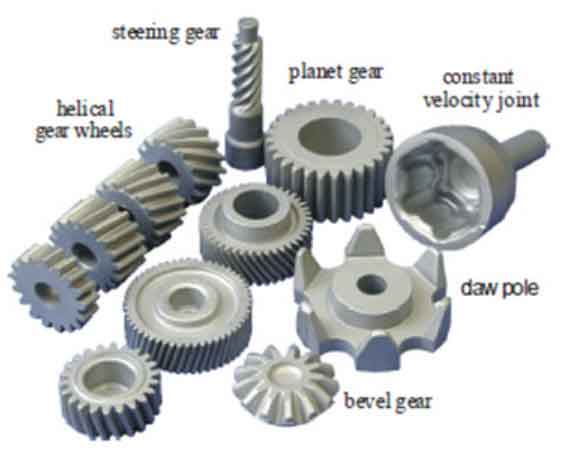Precision forging is a manufacturing process that plays a crucial role in enhancing the strength and durability of metal gears. By subjecting the metal to controlled deformation under high pressure, precision forging aligns the grain structure, eliminates defects, and improves the mechanical properties of the components. This article explores how precision forging enhances the strength and durability of metal gears, leading to superior performance and longevity.

I. Grain Refinement and Alignment:
During precision forging, the metal undergoes plastic deformation under high pressure. This process leads to grain refinement, where the size of the individual grains within the metal is reduced. Smaller grain size enhances the strength of the material, as grain boundaries act as barriers to dislocation movement, resulting in improved resistance to deformation and higher tensile strength. Additionally, precision forging aligns the grains along the direction of the applied stress, further enhancing the material’s strength and resistance to fatigue failure.
II. Improved Mechanical Properties:
Precision forging imparts desirable mechanical properties to the metal gears. The controlled deformation during forging increases the density and compacts the metal, resulting in improved strength, hardness, and impact resistance. The compressive forces experienced during forging can induce work hardening, where the metal becomes stronger and tougher due to the rearrangement of its atomic structure. This enhanced mechanical strength and toughness make precision-forged parts highly reliable and capable of withstanding demanding operating conditions.
III. Enhanced Fatigue Resistance:
Fatigue failure is a significant concern in many applications where metal gears are subjected to repeated cyclic loading. Precision forging helps improve the fatigue resistance of metal components by aligning the grain structure and eliminating defects. The uniformity of grain distribution reduces stress concentration points and prevents crack initiation and propagation, thus increasing the fatigue life of the parts. Precision-forged parts exhibit higher endurance limits and are less prone to fatigue failure, ensuring longer service life and improved reliability.
IV. Superior Material Utilization:
Precision forging optimizes material utilization, leading to increased efficiency and cost savings. Unlike other manufacturing processes that involve extensive material removal, precision forging shapes the metal into the final component with minimal waste. By utilizing the material efficiently, manufacturers can reduce raw material costs and minimize environmental impact. The enhanced strength and durability of precision-forged parts also reduce the need for frequent replacements, resulting in long-term cost savings.
V. Complex Geometries and Design Flexibility:
Precision forging enables the creation of complex geometries and intricate designs with high precision. The process allows for the production of parts with close tolerances, intricate shapes, and internal features that are difficult to achieve through other manufacturing methods. This design flexibility opens up new possibilities for engineers and designers to optimize component performance and functionality while maintaining structural integrity.
VI. Wide Range of Applications:
Precision-forged parts find applications in various industries, including automotive, aerospace, power generation, oil and gas, and heavy machinery. In the automotive sector, precision-forged components are utilized in engine components, transmission systems, suspension parts, and drivetrain assemblies. In aerospace, precision forging is employed in the production of aircraft structural components, landing gear, and turbine blades. The power generation industry benefits from precision-forged parts in turbines, generators, and critical power transmission components. Precision-forged parts are also used in oil and gas exploration and production equipment, where high strength, durability, and resistance to corrosive environments are essential.
Precision forging is a key process for enhancing the strength and durability of metal gears. By refining the grain structure, improving mechanical properties, and optimizing material utilization, precision-forged components exhibit superior performance and longevity. The ability to create complex geometries and the wide range of applications make precision forging a valuable technique in various industries. Through precision forging, manufacturers can produce high-quality, reliable, and long-lasting metal gears that meet the stringent requirements of modern applications.
